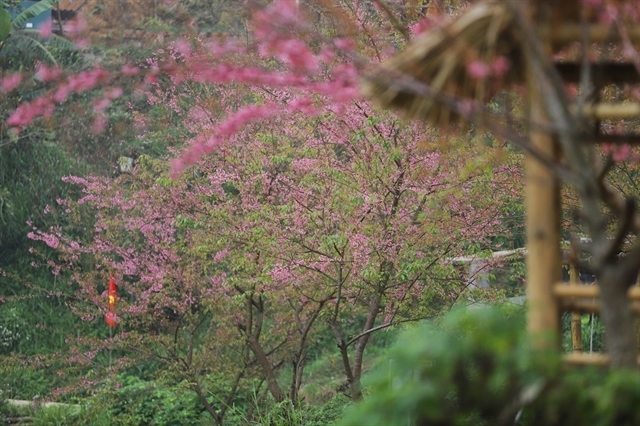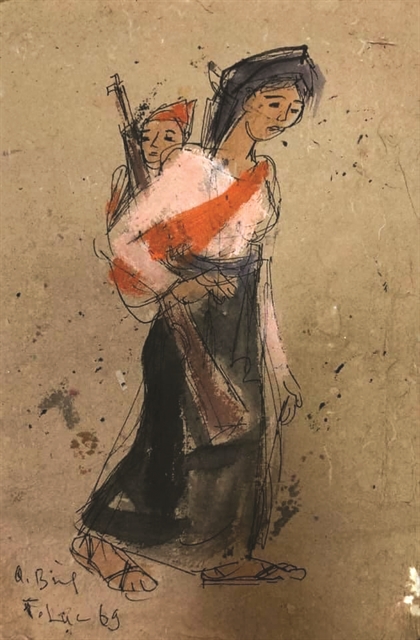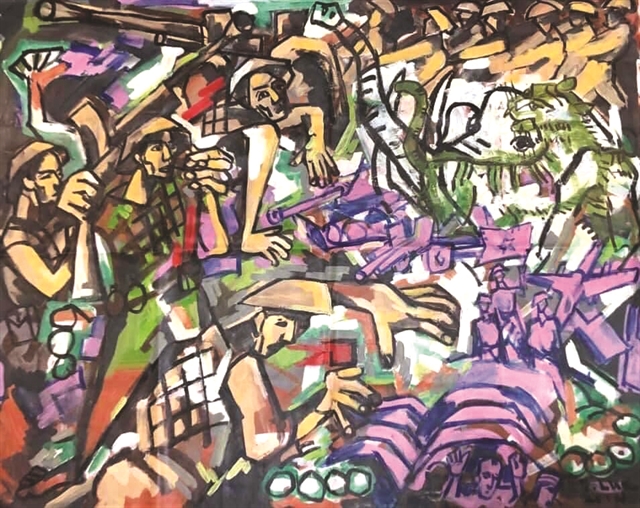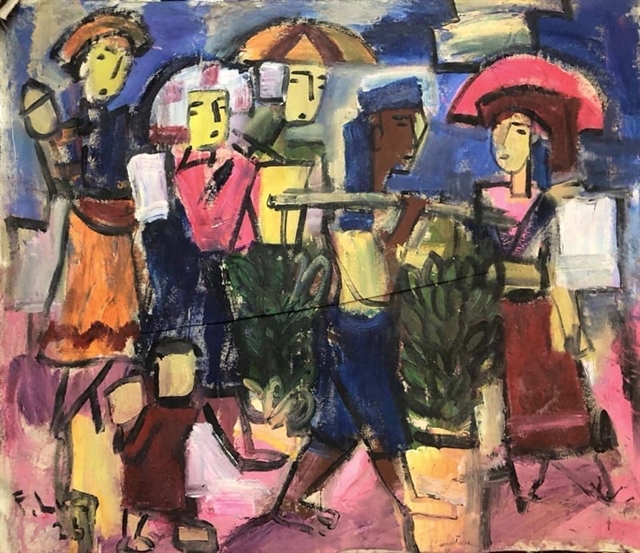 Features
Features

To commemorate 100th anniversary of poet Quang Dũng (1921-2021) Phạm Hà puts his most known poem into perspectives
.jpg)
|
| NATURAL SCENE: 'The mountains and jungles of Tây Bắc, the mystical land'. Oil on canvas by Phạm Lực |
by Phạm Hà
Among the national literature of the Vietnamese struggle in the First Indochinese War, Núi Đôi (Twin Mountains) by Vũ Cao, Đồng Chí (Comrades) by Chính Hữu, and Tây Tiến (Westward Advance) by Quang Dũng are some of my favourite patriotic poems.
Thanks to my passion, I received the highest points in the national university entrance exam in 1993. It changed my life. This is the first time I translated Tây Tiến into English and analyzed this lovely poem in English.
Tây Tiến is one of the most outstanding poems from the early period of the war against the French. Trần Quang Dũng (born Bùi Đình Diệm, 1921-1988) was a multi-talented artist. He was not only a poet but also a painter and a music composer. Perhaps that's why in Quang Dũng's poetry there is both a musical and graphic quality. Quang Dũng's poetic soul is liberal, kind, romantic and pompous, especially when he wrote about the nostalgic land of Xứ Đoài by the Đáy River in northern Việt Nam, and about his comrades.
This poem was composed in 1948 when Quang Dũng departed the Tây Tiến Regiment. It was then that the nostalgia for his comrades and the old battlefield flooded back. He felt an emotional surge to compose a masterpiece. In this poem, we both see the natural beauty of the Northwest region and understand the beauty of the Tây Tiến soldiers.
The poem Tây Tiến was originally named Remembering Tây Tiến, but the author found it too revealing, so in the end just the two words "Tây Tiến" rang both simple and true.
The beauty of the Northwest
As a romantic and flamboyant soldier, he departed at the call of the Motherland, deeply attached to the Northwest mountainous region. When he recalled the Northwest, he remembered the battlefield. All his memories from the past rushed back to him. We see nostalgia pervading from the very beginning of the poem: The Mã River is far away, Tây Tiến!
Recalling the mountains, remembering far away Sai Khao, and covering the tired army with Mường Lát flowers, the repeated words "remember" and then the call "Tây Tiến", sound familiar and earnest. The use of exclamation and personification, especially the image of the Mã River, appears at the beginning of the poem.
This is no longer a mere river of nature, but a river of emotions, mood and inspiration. We know the Mã is the river that flows along the Northwest, that's why Tây Tiến soldiers marched along this land, so the Mã River became the soldier's companion for them to express their feelings.

|
| FAMILY TIES: 'Ethnic Thai mother carries her child'. Oil on canvas by Phạm Lực |
For poet Quang Dũng, it is even more meaningful. The image of River Mã appears from the beginning to the end of the poem. From the image of the river, there are many new places that are both strange and familiar, making the Northwest land appear dear.
Accordingly, the Northwest is not only a piece of land, but also a piece of life, a piece of love, and a piece of the soldiers' soul. And the nostalgia here is not ordinary nostalgia, it is nostalgia without form, a floating nostalgia spreading immensely between the two banks of reality: the past and present.
"Far behind is the Mã River, Westward Advancing troops!
Still thinking of jungles and mountains is a staggering nostalgia
In Sài Khao, mist concealed the well-worn soldiers
In Mường Lát, on a steamy night, the flowers returned
"The upward slope was daunting and tortuous
Among desolate banks of cloud, gun muzzles sniffed the sky
A thousand metres ascend, another thousand descend
Someone’s house in rainy Pha Luông, far away
"A weather-beaten companion halted,
Slumping on his helmet and gun; he left life behind.
In the evening there thundered majestic waterfalls
At night, in Mường Hịch, tigers teased the people.

|
| GLORY: 'Điện Biên Phủ Victory'. Oil on canvas by Phạm Lực |
The rhythm of the poem in Vietnamese makes us feel like the verse is broken in half, stamped, making us feel the relief of the Northwest mountains and forests. The Northwest keeps appearing with the same message, high mountains and deep passes. And then to support such a poetic rhythm, the author uses a lot of syllables: “crooked, deep, entrancing...” and uses counting words like “thousand yards,” or contrasting words and opposite direction such as up and down.
Just like that, the image of the Northwest is fierce and dangerous; it is all wild paths, and the Northwest also includes mystical forests with poisonous water with roaring waterfalls, and Mường Hich tigers teasing people...
When writing about the Northwest like this, Quang Dũng uses powerful and sinewy imagery, richly musical and graphic. Here we do not see the fear of the soldiers, on the contrary, it exalts their strength. Westward Advance resounds like the solid, strong footsteps of the Tây Tiến soldiers.
The Northwest as poetic and lyrical
The first three lines of the poem are very wild, but the last verse is like a shout. In the middle of the dangerous remote mountains, the image of a house floating in the rain creates a romantic feeling, bringing the warmth of life. It shows that the Tây Tiến soldiers are not alone in the mountains. And the image of the house shows a warm, lyrical, and poetic Northwest.
The next verse, “Oh Westward Advance, with the scent of steaming rice. Her season of fragrant sticky rice in Mai Châu,” has a tone that is as rich in music.
Of course, we always have to pay attention to the tone. In Vietnamese the tone is floating like smoke spreading in the middle of the afternoon amidst the mountains, romantic and fanciful.
The phrase "Her season of fragrant sticky rice in Mai Châu", uses the words "season of you (little sister in Vietnamese)", which were a new creation of Quang Dũng in terms of language. Normally, we associate it with the rice, lychee, tangerine and longan seasons, but here Quang Dũng said it was the season of the younger sister.
It is anthropomorphic technique that makes Mai Châu appear close. Mai Châu's image appears as a beautiful girl, highlighting the colour of her lips in youth, and the most beautiful age of the young. For women, the addition of fragrant words evokes a feeling of closeness, abundance and warmth.
The Northwest is both beautiful, desolate, quiet, intense, yet romantic, rich, and full. And within this lyrical dreamy world, two contrasting methods show the alternation between qualities. Intense realism with a romantic, poetic substance creates a harmonious picture. For Tây Tiến (Westward advancing) soldiers, the Northwest is not just nostalgic, not only an image of roughness and wildness, but also a fun and colourful festival of local people in villages where soldiers stayed.
The Northwest is passionate and profound
"The barracks brightened up for a bridal gala
Lo and behold, she already got dressed
Coy she was as the panpipe played a Man tune
Toward Vientiane, the music inspired poetry
"Those of you who left for Châu Mộc that misty evening
Did you notice the spirit of reeds along river banks?
The allure of lasses in a dugout canoe?
Floating on swift-flowing water like reed flowers.
This is the image of the Northwest of passion and depth. Coming to the Northwest land not only brings a wildness and lyrical nature, but also the people of the Northwest full of poetry, music and painting.
The image of a campfire festival full of passion and love for the army men and people is reflected in the jubilant night of celebration with brilliant and splendid colours "lighting up" a "flower torch festival" and the "trumpeting up in tunes".
The graceful girls appearing in the words "already got dressed" and "new colourful clothes" make the party more romantic and lyrical. Because of that, the souls of the soldiers also soar, enthralled in the warm atmosphere of humanity: "Music about Vientiane builds poetic souls."
The next stanza is the image of the afternoon dew. It is soft, vague, fanciful, wild and sacred, which is expressed in the words: "afternoon dew" and "soul wipes the river banks." The people working in the Northwest are idyllic and rustic: "a figure on a canoe", the scenery is charming, full of life, romantic even.
"Floating in the water and the reed flowers swaying."
The image of drifting water and reed flowers swinging evokes the true soul of the Northwest because in the first part "flooding water" shows wildness, but the "swinging reed flowers" of the second part are like a dance on water showing beauty, lightness, and the romantic sophistication of nature.
It can be said that the Northwest is an area of fascination, dreamy and fanciful, yet also earnest and sad, which sows in the soldiers' hearts not only a poetic soul, but an indelible impression of the land. Thanks to his romantic, poetic writing style, Quang Dũng has painted a Northwest that is both fierce and majestic but also lyrical and poetic.
The beauty of the Northwestern soldiers
.jpg)
|
| DEDICATION: 'Tây Tiến soldier'. Oil on canvas by Phạm Lực |
The portrait of the soldiers is realistically depicted through the image of "the army without hair" and "green". We can see that the Tây Tiến soldiers lived and fought in extremely harsh and arduous conditions, in a mysterious forest with poisonous water, so they contracted tropical malaria, they lost their hair, and their skin turned pale yellow. That is the reality of war that Tây Tiến soldiers had to endure, and Quang Dũng portrays it in the most realistic way possible.
Despite the hardships and brutalities of the war, the Tây Tiến soldiers, mostly educated young men of the petty bourgeoisie from Hà Nội, were still people with romantic souls and loving hearts. The image of them as "strong and fierce" is not only the beauty on the outside, but also an aura spreading from the inside, making the enemy afraid, that is of the brave, strong and resilient soldiers of Tây Tiến (the Westward Advancing Regiment).
Another impressive image is that of "glazed eyes", which are very intense eyes, and the dream here is not a regular dream, but the dream and determination of eliminating the enemies of those who went to the war of resistance. Among the sinewy, powerful verses, there is a very soft verse of the “night dreaming about Hà Nội, the graceful beauties". Hà Nội is the homeland, a dear image for the soldiers, and they take the image of their loved ones in their native land as the motivation to fight.
So the soldiers are not giants without hearts, they are not cruel war machines, but people with hearts full of love. Because they love their homeland and the people where they were born, they have a hatred for the enemy and motivation to fight through the hardships of war.
The tragic beauty of the soldiers is reflected in their heroic sacrifice. They are willing to devote their youth to the country "graves scattered along the border", "regardless of green life" they “returned to the land".
Tây Tiến soldiers appear in pain through sacrifice and loss. They passed away peacefully, gently, without attachment. "No regrets" is a word that shows something cruel, not because those soldiers did not cherish their youth, but because they have put the life of the country first.
Another image that evokes the majesty of the soldiers is the image of a "war cloak". In fact, the fallen soldiers do not have a coffin or even a bed mat to roll-up their bodies when sacrificed; they just lie in their military uniforms and are eventually returned to earth.
However, the soldier's uniform is beautified to become a royal robe like the epic images of old knights. The Mã River represents the country that is leaning forward to see the men into eternity. The image of the roaring Mã becomes a farewell song for the soldier, raising the image of the soldier to an epic level, making the soldier immortal.
Through Quang Dũng's poem, the image of the soldier is honest, romantic, sentimental, and at the same time heroic. Using many words with classical and solemn nuances, the author creates a sacred atmosphere, making the soldier's tragic death resonate with nature.
The sound of the last four lines in Vietnamese makes the poetic breath continue to echo endlessly, in harmony with the path of the volunteer soldiers who set out for the country.
"Westward advancing soldiers left without promises
Their remote expedition meant in itself a separation
Those who joined the Westward Advance that spring
Had their minds set for Sầm Nưa, not the plains."

|
| People of various ethnic minorities in the Northwestern land'. Oil on canvas by Phạm Lực |
Quang Dũng's poems are few, but they are considered masterpieces of Vietnamese poetry, such as Westward Advance, River Banks, and Eyes of the Sơn Tây Girl.
These poems have won the admiration of many, and have even been put to song by famous musicians. Westward Advance especially showed the talent of a great national poetic soul, still attractive to readers, and taught as a poetic masterpiece in high schools in Việt Nam today. VNS
| Tây Tiến (Westward Advance) by Quang Dũng Sông Mã xa rồi, Tây Tiến ơi Nhớ về rừng núi, nhớ chơi vơi Sài Khao sương lấp đoàn quân mỏi Mường Lát hoa về trong đêm hơi Far behind is the Mã River, Westward Advancing troops! Still thinking of jungles and mountains is a staggering nostalgia In Sài Khao, mist concealed the well-worn soldiers In Mường Lát, on a steamy night, the flowers returned Dốc lên khúc khuỷu dốc thăm thẳm Heo hút cồn mây, súng ngửi trời Ngàn thước lên cao, ngàn thước xuống Nhà ai Pha Luông mưa xa khơi The upward slope was daunting and tortuous Among desolate banks of cloud, gun muzzles sniffed the sky A thousand metres ascend another thousand descend Someone’s house in rainy Pha Luông, far away Anh bạn dãi dầu không bước nữa Gục lên súng mũ bỏ quên đời Chiều chiều oai linh thác gầm thét Đêm đêm Mường Hịch cọp trêu người A weather-beaten companion halted, Slumping on his helmet and gun, he left life behind! In the evening there thundered majestic waterfalls At night, in Mường Hịch, tigers teased the people Nhớ ôi Tây Tiến cơm lên khói Mai Châu mùa em thơm nếp xôi Oh Westward Advance, with the scent of steaming rice Her season of fragrant fields in Mai Châu
Doanh trại bừng lên hội đuốc hoa Kìa em xiêm áo tự bao giờ Khèn lên Man điệu nàng e ấp Nhạc về Viên Chăn xây hồn thơ The barracks brightened up for a bridal gala Lo and behold, she was already dressed Coy she was as the pan pipe played a Man tune Toward Vientiane, the music inspired poetry Người đi Châu Mộc chiều sương ấy Có thấy hồn lau nẻo bến bờ Có nhớ dáng người trên độc mộc Trôi dòng nước lũ hoa đong đưa Those of you who left for Châu Mộc that misty evening Did you notice the spirit of reeds along river banks? The allure of lasses in dugouts? Floating on swift-flowing water like flowers Tây Tiến đoàn binh không mọc tóc Quân xanh màu lá dữ oai hùm Mắt trừng gửi mộng qua biên giới Đêm mơ Hà Nội dáng kiều thơm
Westward Marching troops went bald Pale like leaves, we stayed fierce as tigers With wide eyes we sent reveries across the border At night, we dreamt of Hà Nội and its charming beauties Rải rác biên cương mồ viễn xứ Chiến trường đi chẳng tiếc đời xanh Áo bào thay chiếu, anh về đất Sông Mã gầm lên khúc độc hành Scattered along the frontier were graves far from home Of those who left for battlefields without regretting their youth Shrouded in uniforms instead of reed mats, they returned to the earth The Mã River roared a solo-journey dirge Tây Tiến người đi không hẹn ước Đường lên thăm thẳm một chia phôi Ai lên Tây Tiến mùa xuân ấy Hồn về Sầm Nứa chẳng về xuôi. Westward Advancing soldiers left without promises Their remote expedition meant in itself a separation Those who joined the Westward March that spring Had their minds set for Sam Nua, not the plains. Phu Luu Chanh, 1948 |




